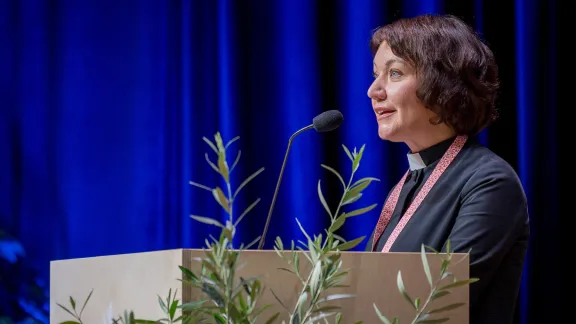14 SEP 2023
LWF General Secretary outlines priorities and progress to delegates at Krakow
“The vitality of a church is not measured by how many members it has, but by its commitment and willingness to serve God and neighbor, by its readiness to walk the talk.” In her address to participants from around the globe attending The Lutheran World Federation (LWF) Thirteenth Assembly in Kraków, Poland, General Secretary Rev. Dr Anne Burghardt outlined the progress and priorities of the worldwide communion of churches.
Speaking on the second day of the 13 to 19 September Assembly, Burghardt looked back at the journey of the LWF from the last Assembly in Windhoek, Namibia in 2017 to the Thirteenth Assembly in Krakow.
“Communion and unity are gifts from God,” she emphasized, and “our task is to keep and to nurture them, making them ever more visible.”
The understanding of being churches in communion was made very visible during the COVID-19 pandemic. The LWF member churches came together in prayer, solidarity, and action. Thanks to support from across the member churches, the LWF could fund 181 COVID-19 related projects in 87 member churches through a new Rapid Response Fund (RRF.) The RRF, Burghardt noted, “proved to be an extremely helpful tool in responding fast to the most urgent needs of churches."

LWF General Secretary Rev. Dr Anne Burghardt presents her report to the Thirteenth Assembly of the LWF in Krakow, Poland. LWF/Albin Hillert
She highlighted how programs such as the LWF’s annual Retreat of Newly Elected Leaders (RONEL) and the Seminar for Lay Leaders, have been important spaces to connect church leaders across the global communion.
Since the last LWF Assembly, Burghardt noted there was hope that international consensus around the United Nations (UN) 2030 agenda would lead to improved living standards for vulnerable people and communities.
However, since the COVID-19 pandemic, there has been increased inequality and “strong pushback against human rights, in particular the rights of women,” with the UN reporting a 40 percent rise in gender-based violence worldwide. More recently, conflicts and wars in several countries including Ukraine, Haiti, Sudan and Ethiopia, “have forced millions to flee in search of safety,” with the number of forcibly displaced people topping 100 million for the first time in history.
The LWF leader pointed to “a growing realization within the secular world of the need to work more closely with faith-based organizations.” In the face of contemporary challenges including the mounting climate crisis, “the erosion of social cohesion and societal polarization,” she said, “the good news is that churches often play a strong role in responding to all these challenges.” The churches, she added “are called to be messengers of hope, not of naïve optimism."
Fear tends to cast out love toward one’s neighbor and therefore toward God.
Rev. Dr Anne Burghardt, LWF General Secretary
Burghardt noted that as people feel insecure and in search of “simple (and often simplistic) answers to complex questions,” there has been an alarming rise in the way “fear is fueled in public discourse.” While the Bible tells us that ‘perfect love casts out fear’ [1 John 4:18], she said, “too often it also works the other way around: fear tends to cast out love toward one’s neighbor and therefore toward God.”
Referring to contexts across LWF regions, the general secretary said, “we may sometimes feel we are faced with an insurmountable task.” In communion, however, “God opens new and exciting ways for us, bringing us together, pooling resources and achieving what might seem impossible: transforming despair into hope.”
Journey from Windhoek to Krakow
Burghardt shared highlights of the LWF’s work over the past six years, noting that five churches (from Cuba, India, Guatemala, Ukraine and Georgia) have joined the communion, while two more (from Cambodia and Indonesia) have begun a two-year interim period prior to full membership. Since the founding of the LWF, she reiterated, one of its aims has been “to bring Lutheran churches closer together to strengthen their joint mission.”
The General Secretary also offered thanks to the many ecumenical guests attending the Assembly, noting that the final day will include a panel discussion on dialogue and joint witness, as well as a Common Word with leaders of the Roman Catholic church. To be Lutheran is to be ecumenical, she reiterated and the aim of Christian unity “is not just doctrinal unity, but also unity in service, witness and prayer.”
Theological education and formation
Burghardt highlighted the need to continue strengthening theological education across the communion. She referred to the launch of the LWF’s Theological Education and Formation network in 2018, as well as the ongoing Lutheran identities process and plans to develop a global online curriculum on Lutheran theology. She spoke about the vital work to affirm women’s equal dignity, particularly in ordained ministry, stressing that “as a global communion, we must engage with the root causes of questioning women’s leadership roles in churches and in societies at large.”
Youth leadership is another priority for the LWF, Burghardt said, noting the vital role that young people in member churches play, especially in peace building and in working for climate justice. Though the LWF introduced a 20 percent youth quota several decades ago, she lamented that “we still struggle in some regions to get sufficient youth as Assembly delegates. We must do better.”
Human dignity, justice and peace
The LWF leader also reviewed key progress made in promoting human dignity, justice and peace through advocacy, as well as humanitarian and development work. She pointed to the new Action for Justice unit, created in the Geneva Communion Office in 2020 to better integrate the work of both the member churches and LWF’s World Service. The latter is “one of the largest faith-based humanitarian actors worldwide,” she said, with more than 8,500 staff serving over 3 million refugees and displaced people.
Burghardt offered thanks to her predecessor, Rev. Dr Martin Junge, who led the LWF for more than a decade, as well as the staff, Council members, partners and related agencies, for their strong commitment to the work of the global communion of churches.
